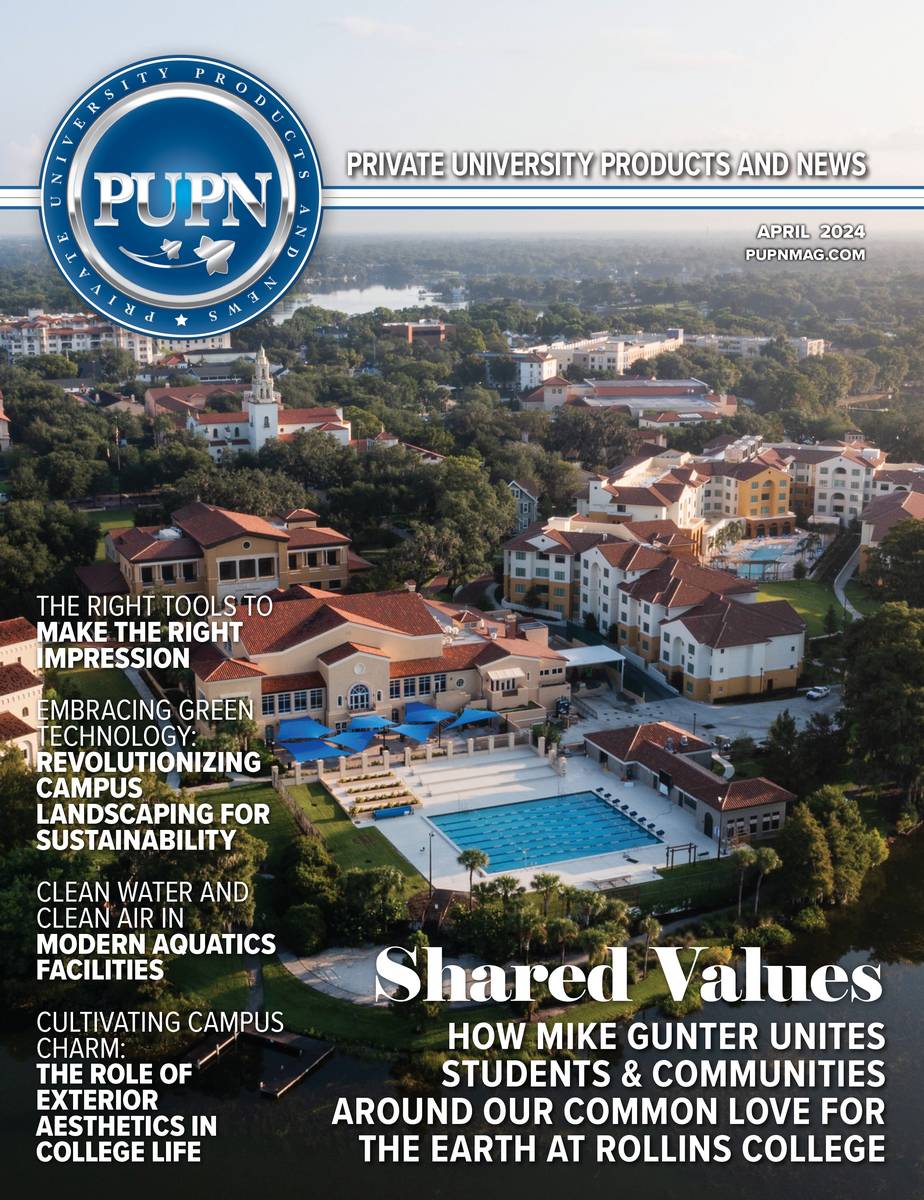In addition to his role as advisor to the AI Initiative at Harvard University and his groundbreaking work in the intersections between AI and industry, as a faculty member in the Tabor School of Business, Munoz has brought his students unique experiences that include working with Zambia to improve the country’s economy, developing a marketing strategy for Ecuadorian handicrafts in the U.S. market, and even taking on the branding strategy for all of Ecuador.
The “Goldilocks” of AI and Industry
When there was some money remaining in the budget for AI, Munoz told the provost that he could always go to another conference, or he could order several books on AI that a few students might read, or he could get a mini-robot. Soon after, he showed up to class with a new kind of teaching assistant in tow.
The robot, Munoz notes, has taken their understanding of AI to another level, and the university has been incredibly supportive in providing tools to help Munoz collaborate with other Millikin faculty to help students work on developing apps to make the robot “smarter.”
Years ago, Al Naqvi, the founder of the American Institute of Artificial Intelligence, asked Munoz to collaborate on a book on AI. At first, Munoz hesitated, saying he wasn’t an expert in artificial intelligence. Naqvi gently teased him-asking if he considered himself an expert on every topic of every book he had ever published. That convinced Munoz. They gathered experts from around the world to talk about AI, and one of the things they learned was how difficult it was to find the middle ground–what Munoz called “The Goldilocks”–between industry-focus and AI-focus. The goal was for the analysis to be “not too deep, not too shallow.”
Munoz stresses that industry needs to evolve and adapt as they use AI. Right now, he estimates, there is $5 billion devoted to AI startups, which means the investment community is betting on it, and AI is estimated to have a huge impact on industries in the near future, representing as much as $5.7 trillion. Recognizing there was “quite a gap in the industry,” with a lot of people who know either “too much or too little,” Munoz was the one to suggest a second book on AI to Naqvi-one that might provide the “more holistic thinking” that was missing from current scholarship.
Munoz wanted to offer, in essence, “a 30,000foot overview” for C-level executives that could provide companies useful advice for applying AI within their companies without becoming too technical. They also wanted something short-about 10,000 words-which turned out to be far harder than the first book they co-edited, as they worked to “crystallize the key concepts” in a thoughtful, useable way for businesses.
Naqvi explains, “AI is transforming business to run on science and scientific evidence. It’s not just about automation. It is about intelligent automation. If AI is cutting headcount and not making you smarter, it’s a problem. That’s like paying for an expensive education while cheating your way through school. Sooner or later, you’d realize that you didn’t learn much and can’t apply any skills-but you ended up with a lot of debt.”
Their book was considered groundbreaking, presented at several conferences, and has been sold in bulk to many companies. Naqvi notes that Munoz is an incredible networker, saying, “With Mark you’re always only two degrees of separation from anyone you’d ever need in business.” These relationships happen, Naqvi explains, because Munoz is well-liked and trustworthy; he adds, “People respect him and want to work with him.”
Microenterprise Zones in Zambia
Munoz had written a book while a Fellow at Harvard, explaining that almost 90% of the world’s businesses are micro-enterprises, making less than ten thousand a month; however, most books offering strategies to improve business are focused on far larger firms and companies. He suggested creating microenterprise zones, trade zones designed for these small businesses, to learn more about research, transportation, or other areas affecting their success.
About six months later, he received a call from someone identifying himself as a minster in Zambia, and assumed he was being pranked. But this was no prank. The Minister of Microenterprise in Zambia had read the book and wondered in which parts of the world Munoz had implemented these theories.
Munoz’s answer was succinct: “Nowhere.” The Minister asked if Munoz would be interested in pioneering this project in Zambia, and Munoz immediately thought, “Sure–with help.” Along with his class of twelve students, Munoz spent the semester focused on what microenterprise zones for small farmers in Zambia would look like-a course that was demanding for both the students and their professor. Student Kelsey Nihiser Zucker took the lead role in the project. Zucker recalls, “We had other classes where we consulted with local businesses as part of our coursework, but this one we knew had an opportunity to create a global impact.”
When Munoz introduced The Microenterprise Zone (MEZO) concept of providing structure to those areas with informal economies, Zucker adds, “We all bought in to the idea and took it to heart.” They had editing sessions until the middle of the night to meet deadlines, but they also had remarkable group cohesion that came from deeply caring about a project and having a strong “shared sense of purpose.”
Zucker explains there couldn’t be a more perfect example of “practical application as an integral part of business education”-a tenet of The Tabor School of Business at Millikin University-than what Munoz offers. His classes are centered on performance learning, she adds, even for first-year or second-year students. She describes Munoz as a “guide and mentor, always making sure that the students had ownership of the project.”
Though the MEZO concept was Munoz’s, Zucker stresses how careful he was to ensure their ideas and work stayed central to the presentation of the project. As an intelligent, well-traveled person with interesting stories about real-world applications, Munoz sparks excitement in his students, she explains, by infusing “a sense of adventure in our learning.”
Reflecting on the experience, Zucker notes, “I think because we knew the stakes, and that this would be ultimately put in front of the Zambian government, the students put their heart and soul into this project.” They were rewarded. After Munoz and his team of undergraduates traveled to Zambia to present their findings, the government of Zambia facilitated a multi-day safari for them.
Introducing Ecuadorian Handicrafts to U.S. Market
A few years after the experience in Zambia, the Trade Commissioner to Ecuador heard of Munoz’s work in Zambia and asked if Munoz would help with a marketing plan for introducing their handicrafts to the U.S. Market. There was not much information for a thorough literature review, but the students dug in and came up with an impressive plan.
Haley Hogenkamp, a Millikin graduate who worked on the project, calls it “an incredibly formative experience for me as an undergraduate.” Becoming aware of opportunities that she had never dreamed of before, Hogenkamp was inspired to serve as a Peace Corps volunteer and is currently at George Washington University, pursuing her master’s in International Affairs. “At the beginning of our project, we had no idea just how immense the undertaking of the project would be,” Hogenkamp notes. “Additionally, it was high stakes. Our findings would inform decision-makers in Ecuador in a way that had never been done regarding handicrafts and the informal business sector.”
Explaining how this was a type of learning unlike anything they had experienced before, she and her classmates served as “researchers, liaisons, managers, and strategists.” In noting the many ways that Munoz goes beyond his role as a professor, Hogenkamp describes him as a coach, a mentor, and a role model-someone who constantly encourages his students, reminding them to be courageous and stay focused on the impact they are making. Aside from the care he exhibits for his students and their professional aspirations, Munoz teaches his charges to think innovatively and creatively about their communities as they perfect their crafts. She adds, “His motivations were clear-to help students, to help a community, and to build a partnership that would better Millikin University and opportunities for students in the future.”
A Branding Project for an Entire Country
The next year, representatives for Ecuador reached out again to see if Munoz and his students would design a branding plan to help a small province in Ecuador that was struggling to entice tourists to visit, and they quickly agreed. Soon after, Munoz received another call; they asked if Munoz and team would be willing to plan the global branding strategy for the entire country.
With only eight students in the class that semester, which meant an even smaller team than normal, Munoz went to his undergraduates to see what they thought. While they were “really, really scared,” he recalls, they also recognized the magnitude of the opportunity being offered. Student Olivia Brewer took on the lead role in the project. Brewer recalls, “Creating a global brand strategy for the government of Ecuador was undoubtedly the biggest project I have worked on at Millikin.” In their small class of eight, as she remembers Munoz saying, it was as though they were “competing in the Super Bowl.”
After preparing months of primary and secondary research, the students decided they needed to completely restructure the report as it was, which–of course–created even more strain. Brewer notes they devoted over twenty hours a week to ensure the final report was outstanding. Despite a great deal of work and pressure falling to Munoz as well, he was incredibly proud of what they produced; they presented virtually in a video conference for people in Ecuador, Chicago, New York, and Spain.
Brewer added, “It was well worth the effort when we saw what a huge impact our research and global strategy could have on the country as a whole. The Consul, Trade Commissioner, and other government representatives were greatly satisfied with our findings and suggestions, which felt really gratifying after all of the hard work we dedicated to the project.” Brewer credits Munoz for bringing this opportunity to her class and guiding them all to succeed-with his widespread network connections, his encouragement, his international expertise, and his unrelenting positivity.
An Endlessly Inventive Professor
Dr. Jeffrey Aper, Provost at Millikin University, shares that it is not at all uncommon for Millikin professors and their students to gain acclaim, whether that be locally, statewide, nationally, or internationally. “Mark is a prime example,” Aper adds-a faculty member committed to his students, which makes him both a wonderful colleague and an “endlessly inventive” asset to the university-someone who is always seeking new projects and new ways to engage their students.
On any given day, Aper notes, he could get a text from Munoz about a presentation in Italy or a foreign government requesting their assistance. No matter the opportunity presented to Munoz, Aper stresses, he always looks for ways to involve the students and give them opportunities to learn that extend their education beyond the classroom. “He epitomizes the character of the faculty,” Aper concludes, a group of people all committed to taking any extra steps for their students to help them understand what it means to be engaged professionals and to be involved citizens.
Aper quotes Millikin’s president, Dr. Patrick E. White, who often states that Millikin students are “learning courage.” They learn the courage of action. The leaders at Millikin believe so deeply in the impact their students can make on the larger world, Aper adds, that “it’s what we care about the most.”
A Heart That Won’t Say No
Each time he wraps a project, Munoz tells himself he can’t top what has just been done, while reflecting on how exhausting the work can be. He decided to give himself a break for the year. Then, he received a call-this one from the owners of a Bed & Breakfast in a struggling city in Florida, once a popular spot for tourism, where some small-business owners are now in trouble. They hoped to create a global branding strategy.
Munoz considered all the ways they had been working to improve other countries, and now a place in America needed their help. Though this project might not be as “glamorous” to outsiders as the larger projects, he admits, it was one that was “straight from the heart.” Not surprisingly, he determined, “How could I say no?”










